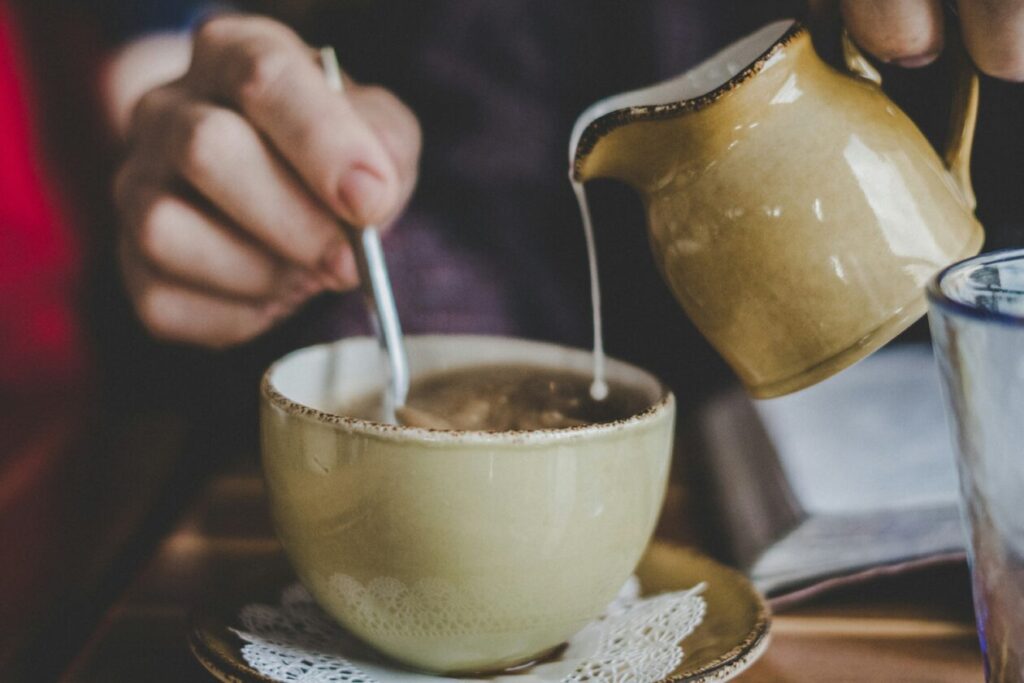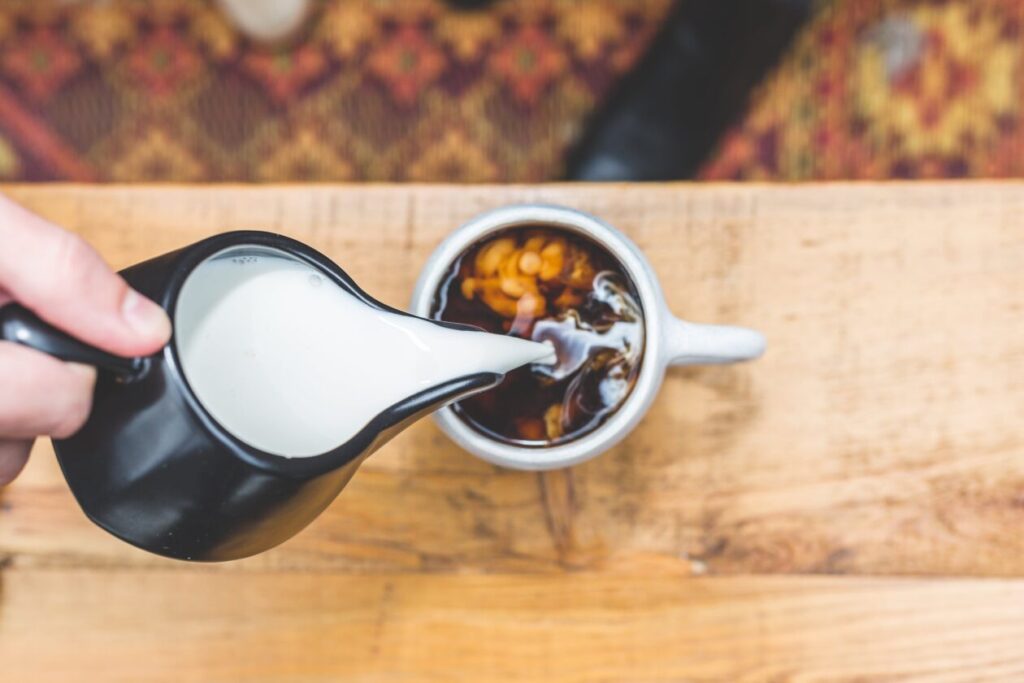Introduction
One of the most popular drinks in the world, tea is prized for its many health advantages and variety of tastes. From its beginnings in ancient China, its fame has spread over continents, enthralling nations. Tea has a particular place in the hearts and routines of millions of people worldwide, from the aromatic richness of Indian masala chai to the soothing warmth of a typical English breakfast tea.
Adding milk to tea is a common and deeply ingrained ritual in many countries, including portions of Asia, the United Kingdom, and India. Many people enjoy this creamy, decadent combination made from blending tea and milk. But in the middle of discussions about its health effects, one topic frequently arises: Is milk tea good for weight loss?
This article examines the possible advantages and disadvantages of adding milk to tea, focusing on how it may affect weight management. We aim to offer a thorough analysis supporting educated dietary decisions by looking at scientific studies, nutritional insights, and cultural viewpoints. This investigation attempts to provide deep and lucid insight into the topic, regardless of your interest in tea or its impact on weight loss.
Composition of Milk Tea
A delicious blend of milk and tea, milk tea usually consists of milk and steeped tea leaves, with optional flavorings or sugar added in some cases. Many tea leaf options are available; black tea, green tea, and herbal blends are just a few. Each adds a distinct flavor to the finished drink. The milk adds a creamy texture and a hint of sweetness, which improves the flavor profile overall.
It’s important to look at milk tea’s calorie count and major ingredients while analyzing its nutritional qualities. The amount of milk added, the type and quantity of tea used, and any other ingredients can all affect how many calories a milk tea has. Due to the addition of milk and possible additives, milk tea often has more calories than plain tea.
Key components of milk tea include vital nutrients in both milk and tea. Antioxidants found in tea leaves, such as flavonoids and catechins, have been linked to several health advantages, including support for the metabolism. Important minerals for bone health and general well-being, such as calcium, protein, and vitamin D, are found in milk. On the other hand, additional sugars and syrups should be avoided as they might raise the calorie count without adding much nutritional benefit.
Although milk tea can be an enjoyable and fulfilling drink, its ability to help people lose weight relies on several variables, including lifestyle and overall eating habits. Moderate milk tea consumption within a balanced diet may only sometimes be beneficial to attempts to lose weight. To reduce the amount of excess calories consumed, paying attention to portion sizes and choosing healthier alternatives, like unsweetened or mildly sweetened versions, is crucial.
Furthermore, when paired with a healthy diet and frequent exercise, utilizing tea’s potential health benefits—including its ability to speed up metabolism—can support a weight loss program. Ultimately, dietary requirements, personal preferences, and general lifestyle factors will determine whether or not milk tea aids in weight loss. Making educated decisions and balancing is essential to achieving and maintaining healthy weight management objectives.
Health Benefits of Milk Tea

The antioxidant qualities found in tea leaves are one of milk tea’s main health advantages. Whether herbal, green, or black tea, these drinks contain antioxidants like flavonoids and catechins that help the body fight oxidative stress. Free radicals must be neutralized to prevent cellular damage and age-related disorders, and here is where antioxidants come in. Drinking milk tea regularly may help people increase their intake of antioxidants, which will benefit their general health and well-being.
Besides the antioxidant-dense qualities of tea leaves, milk tea offers vital nutrients from milk. Calcium, potassium, and other vitamins, such as vitamin D and B12, can all be found in milk. These nutrients are essential for blood pressure regulation, muscular function, and bone health maintenance. Tea made with milk has more flavor and texture and is more nutritious, making it a healthy beverage option for people who want to increase their consumption of nutrients.
Depending on the tea and milk used, milk tea may provide health advantages beyond antioxidants and necessary minerals. For instance, several herbal teas, like peppermint or chamomile, are well-known for their relaxing qualities and may aid in reducing tension and encouraging relaxation. In addition, milk tea’s warming properties can have calming benefits on the digestive tract, which makes it a well-liked option for settling an upset stomach or easing mild gastrointestinal pain. Even though further studies are required to completely comprehend these possible advantages, including milk tea in a balanced diet can improve general health and well-being.
In conclusion, milk tea’s pleasant taste and possible health advantages are made possible by milk’s nutritious value and the tea leaves’ antioxidant qualities. People can benefit from milk tea’s antioxidant-rich ingredients and vital nutrients, which promote several health aspects, by consuming it as part of a balanced diet. Milk tea can add taste to a healthy lifestyle when finished as a soothing beverage or included in a wellness program.
Studies and Research
Research has looked into the possible link between drinking tea and losing weight. Due to its high concentration of catechins, a type of antioxidant thought to encourage fat oxidation and metabolic rate, green tea, in particular, has attracted much interest. Studies indicate that catechins improve fat metabolism and increase energy expenditure, which helps with weight management. Though some research has shown that tea can help with weight loss, the results still need clarification. They can vary based on several factors, including dosage, length of intake, and individual metabolic variances.
Researchers have disagreed about the function of milk in tea and how it affects weight loss. While some research indicates that consuming pure tea may have fewer health benefits, other studies contend that milk does not affect tea’s ability to aid in weight loss. Remember that milk increases the beverage’s calorie and fat content, which may negate any metabolic advantages from tea alone. However, the total effect could vary depending on the kind and amount of milk consumed, personal eating habits, and lifestyle choices.
Considering the complexity and limits of previous studies is critical as the body of knowledge regarding the connection between tea, milk, and weight loss develops. Future research endeavors may close these gaps by conducting extensive, controlled experiments examining the precise mechanisms underpinning tea’s possible impacts on metabolism and body composition. Furthermore, studying how tea, milk, and other food ingredients interact may offer insightful information about how to best implement weight loss plans. People can make educated judgments about including milk tea in their dietary patterns with their weight reduction objectives in mind by keeping up with the most recent scientific findings and critically analyzing research.
Effects of Milk on Tea Compounds

Adding milk to tea creates a complex interaction between the ingredients in the two drinks. One important factor is how tea’s polyphenols and catechins interact with milk proteins like whey and casein. Various factors, like the type of milk used and the tea’s temperature, can affect these interactions. According to certain research, tea polyphenols may attach to milk proteins, impacting the body’s ability to absorb and utilize them. However, the degree to which these interactions affect tea drinking’s overall health advantages is still up for discussion and investigation.
Antioxidants aid the body’s defense against dangerous free radicals, shielding cells from oxidative stress and inflammation. Tea is well known for having a high concentration of antioxidants, especially catechins like epigallocatechin gallate (EGCG), which may help with weight loss, among other health advantages. Nevertheless, some research indicates that milk may lessen the antioxidant activity of tea. Tea polyphenols are thought to bind to milk proteins, which may interfere with their antioxidant effects and cause this occurrence. Although these results cast doubt on the best way to drink tea to get the most health advantages, additional investigation is required to understand how milk affects tea’s antioxidant activity and weight reduction.
There are other choices to think about for those who want to maximize the possible weight reduction advantages of tea while limiting any potential interference from milk. In contrast to black or oolong teas, selecting teas with a greater catechin concentration, like matcha or green tea, may provide a more concentrated source of antioxidants.
Tea’s antioxidant activity may also be preserved by experimenting with alternative brewing techniques, such as steeping it for shorter periods or at lower temperatures. Adding milk to tea should be based on personal preferences and dietary needs, considering potential trade-offs between flavor and health advantages. People can make empowered decisions supporting their wellness objectives by staying current on the most recent research and looking into alternate possibilities.
Milk Tea and Weight Loss

More research is needed, especially on how drinking milk tea can affect weight loss. Studies have been conducted on the impact of dairy consumption on body composition and the possible benefits of tea drinking for weight control. Still, only some have particularly examined the combination of tea and milk. However, some circumstantial evidence suggests that certain tea components, such as caffeine and catechins, may aid in weight loss by speeding up metabolism and encouraging fat burning.
However, adding milk to tea increases its calorie and nutritional content, which may outweigh any possible advantages for weight loss. Further study is required to completely comprehend the connection between drinking milk tea and how it affects managing weight.
Several variables could affect whether drinking milk tea causes weight gain or loss:
- The kind and quantity of tea consumed might change greatly, as different types have differing concentrations of bioactive substances. For instance, because of its high catechin concentration, green tea is frequently promoted as having the ability to help people lose weight.
- The amount of milk that is added to tea can have a big impact on its nutritional and calorie content. Dairy products include calories, which may be an issue for people watching their energy consumption, even if they have important minerals like calcium and protein.
- A person’s metabolism, lifestyle choices, and the general nutritional context all play significant roles in determining the overall impact of milk tea consumption on weight.
Taking a comprehensive approach to weight management is imperative, considering a range of dietary and lifestyle aspects instead of concentrating only on specific food and beverage choices.
Moderation and careful usage are essential to enjoying milk tea while trying to lose weight. Selecting lower-calorie milk substitutes like almond or skim milk can assist in lowering the beverage’s total calorie count. Furthermore, maintaining a well-rounded diet of whole foods, fruits, and vegetables and controlling portion sizes will help with overall weight management.
In addition to adding variation, experimenting with various tea types and brewing techniques may improve the health advantages of milk tea. In the end, milk tea can be included in a balanced diet, but when trying to lose weight, it’s important to consider how many calories it contains and how it affects eating habits. Long-term maintenance of a healthy weight requires making educated decisions and concentrating on sustainable lifestyle adjustments.
Risks and Downsides
While many people find milk tea a tasty and soothing beverage, it’s important to be aware of any potential risks, especially about weight management. One thing to be mindful of is the calorie count of milk tea, which can change based on several variables, like the kind of tea used, the quantity of milk added, and any extra flavorings or sweeteners. When people habitually drink calorie-dense liquids like milk tea without considering their energy level, it might be difficult for them to maintain a calorie deficit and lose weight.
Furthermore, as dairy products are frequently included in milk tea recipes, some people may have symptoms of lactose intolerance or experience pain in their digestive tract. While still enjoying the taste of milk tea, you can reduce these hazards by avoiding portion amounts and using lower-calorie milk substitutes.
When assessing the effect of milk tea on weight loss, it’s important to consider the inclusion of high-calorie ingredients and added sugars. Many milk tea items sold commercially have high sugar content, which can increase excessive calorie intake and eventually cause weight gain. Consuming too much sugar has been connected to several harmful health outcomes, including type 2 diabetes, obesity, and cardiovascular disease. Furthermore, some additions, such as flavoring syrups or creamers, may raise milk tea’s calorie and sugar content even more, offsetting any possible weight-management advantages.
Therefore, selecting unsweetened or mildly sweetened milk tea options and being aware of their total sugar intake from beverages and other sources may benefit those seeking to maximize their weight reduction efforts.
Several doable tactics might be used to reduce the possible hazards of milk tea usage while promoting weight loss objectives:
- Choosing handmade or freshly brewed milk tea gives you more control over the ingredients and serving sizes, lowering the risk of consuming too many calories. Trying out naturally flavored or unsweetened teas can offer delicious substitutes for the more conventional sweetened milk tea variants.
- Any possible detrimental effects on weight management can be mitigated by using milk tea in a balanced diet, emphasizing whole foods, lean proteins, and abundant fruits and vegetables.
- Making water or other unsweetened alternatives your main source of hydration will help you lose weight and maintain your general health over time.
Tips for Making Healthier Milk Tea
Mindful choices can make a big difference in enjoying milk tea while prioritizing weight loss objectives. One smart tactic is choosing lower-calorie milk substitutes over full-fat dairy products, such as almond milk, soy milk, or skim milk. These substitutes can deliver the flavor and creamy texture without consuming too many calories. Furthermore, controlling calorie intake can be achieved by considering the quantity and frequency of milk tea drinking. Smaller portions and saving milk tea for special occasions rather than as a regular treat will help promote a balanced approach to weight management.
Making milk tea that promotes general health and well-being requires selecting better ingredients and preparation techniques. First, choose premium tea leaves or bags free of artificial flavorings or extra sweeteners. Better control over the ingredients and a fresher, more delicious beverage are guaranteed when brewing tea at home. If you want sweeteners, use natural options like agave syrup, honey, or stevia sparingly. In addition, you can improve the flavor of milk tea without adding too much sugar by adding aromatic spices like cardamom, nutmeg, or cinnamon. Making personalized adjustments to the sweetness levels and experimenting with different flavor combinations can result in a more pleasurable and fulfilling milk tea experience.
Ultimately, having milk tea as part of a balanced diet is about figuring out a long-term strategy that fits personal preferences and objectives. Keeping an eye on your caloric intake and the ingredients you choose is crucial, but indulging occasionally is also critical. Milk tea can be a tasty and fulfilling beverage that supports a healthy lifestyle by using more nutritious ingredients, controlling portions, and practicing mindful consumption. Finding the right balance between indulging and pacing oneself is essential to enjoying milk tea’s health benefits while promoting weight loss and general well-being.
Is Milk Tea Good for Weight Loss?
A. Short Answer:
Milk tea, while delicious, isn’t a silver bullet for weight loss. While it can be part of a healthy diet, it’s not likely to directly contribute to significant weight loss.
B. In-Depth Analysis:
Regarding weight loss, the key factors are calorie intake and expenditure. Milk tea, typically made with tea, milk, and sometimes sugar or sweeteners, contains calories. While tea is known for its antioxidant properties and potential metabolism-boosting effects, adding milk and sweeteners can increase its calorie content.
Moreover, the impact of milk tea on weight loss can vary from person to person. Some may find that including milk tea in moderation fits their overall dietary goals. In contrast, others may need to be more cautious, especially if they’re sensitive to the calories or sugars in the beverage.
It’s essential to approach milk tea as a balanced diet. While it can be a tasty beverage, relying solely on milk tea for weight loss isn’t advisable. Instead, focusing on a diet rich in whole foods, lean proteins, fruits, vegetables, and regular physical activity is a more sustainable approach to achieving and maintaining a healthy weight.
In summary, milk tea can be a delightful addition to your diet, but it’s not a miracle solution for shedding pounds. Enjoy it in moderation as part of a balanced lifestyle, and be mindful of the ingredients and portion sizes to support your overall health and weight management goals.
How to Make Milk Tea for Weight Loss
To make milk tea conducive to weight loss, follow these simple steps:
- Choose the Right Tea: Opt for green or oolong tea, known for its metabolism-boosting properties.
- Use Low-Fat Milk: Substitute full-fat dairy with skim or almond milk to reduce calorie intake.
- Limit Sweeteners: Use natural sweeteners like stevia or honey sparingly to avoid excess calories.
- Experiment with Flavorings: Enhance the taste of your milk tea with natural flavorings like cinnamon or ginger instead of high-calorie additives.
- Mindful Preparation: Pay attention to portion sizes and steeping times to control calorie intake.
Sample Milk Tea Recipe for Weight Loss:
Ingredients:
- 1 cup of water
- Two teaspoons of black tea or one teabag or 1 Tea Drop
- One teaspoon of brown sugar or your alternative sweetener
- ¼ cup of your preferred low-fat milk
Instructions:
- Begin by boiling fresh water in a pan or kettle.
- Place your teabag or Tea Drop in your cup.
- Pour the hot water over the tea and let it steep for about 5 minutes, adjusting the brewing time based on your preference for tea strength.
- Remove the tea bag or strain the tea to remove loose leaves.
- Stir in your sweetener until dissolved.
- Slowly add the low-fat milk, adjusting the amount to achieve your desired color and consistency.
- Give your milk tea a final stir, then sit back, relax, and savor every sip of your perfectly brewed cup.
Following these simple steps and mindful ingredient choices, you can enjoy a satisfying cup of milk tea that complements your weight loss journey while indulging your taste buds.
FAQ Section
Can you drink milk tea during weight loss?
You can drink milk tea during weight loss, but moderation and mindful ingredient choices are key. Opt for low-fat milk and limit added sugars to keep calorie intake in check.
Can I drink milk during weight loss?
Yes, you can include milk in your diet during weight loss. Choose low-fat or skim milk options to reduce calorie intake while benefiting from essential nutrients like calcium and protein.
Is it OK to drink milk tea every day?
Drinking milk tea daily can be acceptable as part of a balanced diet. However, be mindful of portion sizes and ingredients to avoid excessive calorie consumption.
Is coffee or milk tea better for weight loss?
Both coffee and milk tea can be part of a weight loss plan when consumed in moderation. However, unsweetened coffee tends to be lower in calories and may offer a slight edge for weight loss.
Is milk tea high in calories?
The calorie content of milk tea can vary depending on factors like the type of tea, milk used, and any added sweeteners. Choosing low-fat dairy and minimizing added sugars can help moderate the calorie count.
Is milk tea healthy?
Milk tea can be a part of a healthy diet when prepared with nutritious ingredients and consumed in moderation. It can provide hydration, antioxidants from tea, and essential nutrients from milk.
How many calories are in milk tea?
The calorie content of milk tea varies depending on factors like the type of tea, amount of milk, and any added sweeteners. A cup of milk tea may contain around 50-100 calories.
Can I drink milk tea without sugar for weight loss?
Yes, drinking milk tea without added sugar can benefit weight loss as it reduces calorie intake while still providing hydration and potential health benefits from tea and milk.
Can I drink 1 cup of milk tea every day?
Drinking one cup of milk tea daily can be acceptable as a balanced diet. However, be mindful of portion sizes and overall calorie intake to maintain a healthy weight.
How much milk tea is too much?
Consuming excessive amounts of milk tea, especially if high in calories from added sugars and full-fat milk, can contribute to weight gain and other health issues. Moderation is key.
How much fat is in a cup of milk tea?
The fat content in a cup of milk tea depends on the type and amount of milk used. Using low-fat or skim milk reduces fat, typically from 0-3 grams per cup.
Can I drink milk tea before a workout?
Drinking milk tea before a workout can provide hydration and a small energy boost from caffeine. However, avoid heavy or sugary milk teas that may cause discomfort during exercise.
Is milk tea full of sugar?
Milk tea can be high in sugar if sweetened with added sugars or syrups. Opt for unsweetened or lightly enhanced versions to minimize sugar intake.
Is milk tea better than coffee?
Both milk tea and coffee can be part of a healthy diet when consumed in moderation. The choice between them depends on personal preference and nutritional needs.
What is the unhealthiest milk tea?
The unhealthiest milk teas are those loaded with added sugars, full-fat milk, and high-calorie flavorings or toppings. These can contribute to weight gain and other health issues when consumed regularly.
Can we drink milk tea without sugar during weight loss?
Yes, drinking milk tea without added sugar can support weight loss by reducing calorie intake while providing hydration and potential health benefits.
Does milk tea increase belly fat?
Consuming excessive amounts of high-calorie milk tea, especially when sweetened with added sugars, can contribute to weight gain, including belly fat. Opt for lighter versions to minimize this risk.
Does milk tea without sugar make you fat?
Milk tea without added sugar is lower in calories and can be part of a weight loss plan when consumed in moderation. It’s the excess calories, not necessarily the absence of sugar, that leads to weight gain.
Can we drink chai during weight loss?
Chai, especially when prepared with low-fat milk and minimal sweeteners, can be included in a weight-loss diet. Be mindful of portion sizes and ingredients to manage calorie intake effectively.
Conclusion
Milk tea is a tasty addition to your diet and may have some health benefits, but you should always consume it in moderation, particularly if you’re trying to lose weight. There is scant and conflicting data about milk tea’s direct effect on weight loss. Adding milk and sugar to tea can increase calorie consumption and potentially undermine weight loss efforts, even if tea has antioxidants and may speed metabolism. Losing weight by drinking only milk tea might not work very well.
It’s important to treat milk tea as part of a balanced diet rather than seeing it as a magic cure for weight loss. Milk tea tastes great when you drink it in moderation. Try lighter varieties with less added sugar and low-fat milk to enjoy the flavors fully. Attaining long-term weight loss objectives requires combining milk tea with a balanced diet and frequent exercise.
Though opinions on whether or not milk tea helps people lose weight are divided, millions worldwide still adore this popular beverage. Its adaptability in taste profiles, components, and preparation methods captures the variety of civilizations that value this cozy beverage. Whether you enjoy Hong Kong-style milk tea, classic Indian chai, or hipster bubble tea, milk tea never fails to entice the senses and unite people worldwide. Therefore, its cultural value and enjoyment are undeniable, even though its impact on weight loss may be questionable. Accept milk tea as a part of your daily routine and enjoy its flavor while considering its possible impact on your quest for health and well-being.
Reference
Health Benefits Of Tea: Milking It Or Not. (2012, September 27). NPR. https://www.npr.org/sections/thesalt/2012/09/27/161895873/health-benefits-of-tea-milking-it-or-not
Singh, B. N., Shankar, S., & Srivastava, R. K. (2011). Green tea catechin, epigallocatechin-3-gallate (EGCG): Mechanisms, perspectives and clinical applications. Biochemical Pharmacology, 82(12), 1807-1821. https://doi.org/10.1016/j.bcp.2011.07.093
Brown, P., & Wright, W. (1962). An Investigation of the interactions between milk proteins and tea polyphenols. Journal of Chromatography A, 11, 504-514. https://doi.org/10.1016/S0021-9673(01)80953-5
Nagao, T., Yumiko Komine, Soga, S., Shinichi Meguro, Hase, T., Tanaka, Y., & Ichiro Tokimitsu. (2005). Ingestion of a tea rich in catechins leads to a reduction in body fat and malondialdehyde-modified LDL in men. The American Journal of Clinical Nutrition, 81(1), 122–129. https://doi.org/10.1093/ajcn/81.1.122
Kubala, J. (2018, March 18). 5 Ways That Drinking Milk Can Improve Your Health. Healthline; Healthline Media. https://www.healthline.com/nutrition/milk-benefits#TOC_TITLE_HDR_2
Tea. (2019, July 26). The Nutrition Source. https://www.hsph.harvard.edu/nutritionsource/food-features/tea/
Was this helpful?

Joseph Emb, RDN
Founder of StyleVitally.com | Registered Dietitian & Wellness Advocate
What I Cover:
I’m passionate about connecting nutrition science and everyday wellness to help people live healthier, more vibrant lives. I write about evidence-based nutrition, mindful eating, sustainable lifestyles, and holistic well-being at StyleVitally.com.
My Background:
The University of Texas in Austin, where I earned my Dietetics diploma, laid the groundwork for my nutrition and health career. My training and hands-on experience taught me the science and art of using nutrition to enhance health and well-being.
Professional Journey:
I’m an RDN with lots of experience. I’ve helped people seeking tailored nutritional recommendations in clinical settings and community outreach programs. My constant learning and professional development ensure that my recommendations are always based on the latest evidence.
Ethical Commitment:
My practice prioritizes integrity. My content is transparent and objective, following the most significant ethical standards. I can give my audience unbiased advice because I’m not affiliated with food businesses or industry associations. I want to help people make informed health decisions that match their values and ambitions.
Join Me on the Wellness Journey:
Join me on the path to vitality and well-being, whether facing nutritional issues, seeking sustainable lifestyle changes, or simply wanting a better, happier you. We’ll discover how diet, mindfulness, and holistic well-being can maximize your potential.









